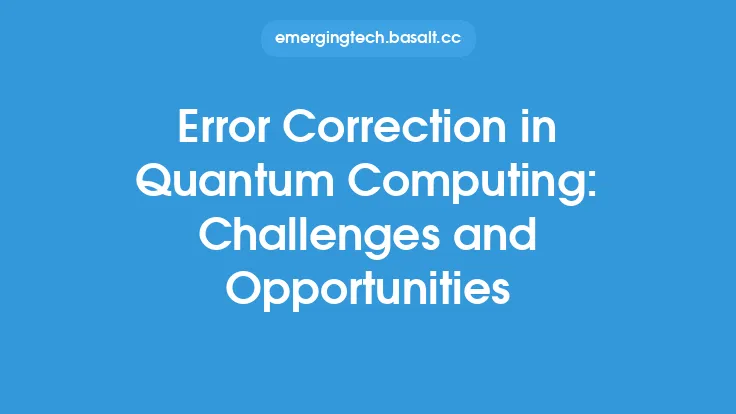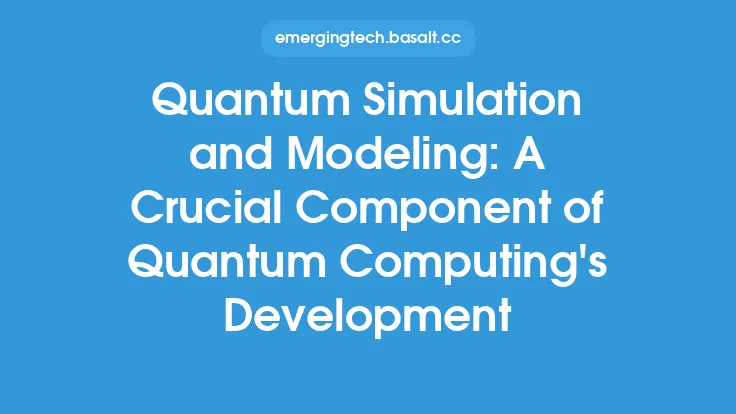The concept of quantum computing has been around for several decades, with its roots dating back to the early 20th century. The idea of using quantum mechanics to perform computations was first proposed by physicist Paul Benioff in 1980, and since then, the field has undergone significant developments and advancements. In the early days, quantum computing was largely theoretical, with most of the work focused on understanding the fundamental principles of quantum mechanics and how they could be applied to computing.
Early Developments
The 1980s saw a surge of interest in quantum computing, with several key papers and proposals being published. One of the most influential papers was written by David Deutsch in 1985, which introduced the concept of a quantum Turing machine. This paper laid the foundation for the development of quantum algorithms and paved the way for the creation of the first quantum computers. Around the same time, physicists like Richard Feynman and Yuri Manin began exploring the idea of using quantum systems to simulate complex quantum phenomena, which led to the development of quantum simulation techniques.
Quantum Computing Hardware
The development of quantum computing hardware has been a significant challenge in the field. The first quantum computers were built using ion traps and optical lattices, which allowed for the manipulation of individual quantum bits (qubits). In the 1990s, the first quantum computer using ion traps was built by a team of researchers at the University of Innsbruck. This early quantum computer was able to perform simple calculations, but it was not until the development of more advanced technologies like superconducting qubits and topological quantum computers that the field began to see significant advancements. Today, companies like Google, IBM, and Rigetti Computing are at the forefront of quantum computing hardware development, with many others following closely behind.
Quantum Algorithms and Software
The development of quantum algorithms and software has been a crucial aspect of quantum computing. In 1994, Peter Shor discovered a quantum algorithm that could factor large numbers exponentially faster than any known classical algorithm. This breakthrough led to a surge of interest in quantum computing and sparked a new wave of research into quantum algorithms. Other notable algorithms include Grover's algorithm, which can search an unsorted database in O(sqrt(N)) time, and the quantum approximate optimization algorithm (QAOA), which can be used to solve complex optimization problems. Today, there are many software frameworks and libraries available for quantum computing, including Qiskit, Cirq, and Q#. These tools provide a platform for developers to build and run quantum algorithms on a variety of quantum hardware platforms.
Quantum Error Correction and Noise Reduction
One of the major challenges in quantum computing is the issue of quantum noise and error correction. Quantum computers are prone to errors due to the fragile nature of qubits, which can lose their quantum properties due to interactions with the environment. To overcome this challenge, researchers have developed a range of quantum error correction techniques, including quantum error correction codes and noise reduction methods. These techniques allow for the detection and correction of errors, enabling the development of more reliable and robust quantum computers. Companies like IBM and Google are actively working on developing more advanced quantum error correction techniques, which will be essential for the development of large-scale quantum computers.
Current State and Future Directions
Today, quantum computing is a rapidly evolving field, with significant advancements being made in both hardware and software. Companies like Google, IBM, and Microsoft are investing heavily in quantum computing research and development, and many startups are emerging with innovative solutions and applications. The current state of quantum computing is characterized by the development of noisy intermediate-scale quantum (NISQ) devices, which are capable of performing certain types of computations but are not yet robust enough for large-scale applications. However, as the field continues to advance, we can expect to see the development of more powerful and reliable quantum computers, which will enable a wide range of applications, from cryptography and optimization to machine learning and materials science. The future of quantum computing holds much promise, and it will be exciting to see how this technology evolves and transforms the world in the years to come.
Conclusion and Outlook
In conclusion, the history and evolution of quantum computing have been marked by significant advancements and breakthroughs. From the early days of theoretical proposals to the current development of quantum hardware and software, the field has come a long way. As we look to the future, it is clear that quantum computing has the potential to revolutionize a wide range of fields and industries. However, there are still many challenges to be overcome, including the development of more robust and reliable quantum computers, the creation of more advanced quantum algorithms, and the establishment of standards and protocols for quantum computing. Despite these challenges, the outlook for quantum computing is bright, and it will be exciting to see how this technology continues to evolve and transform the world in the years to come.





